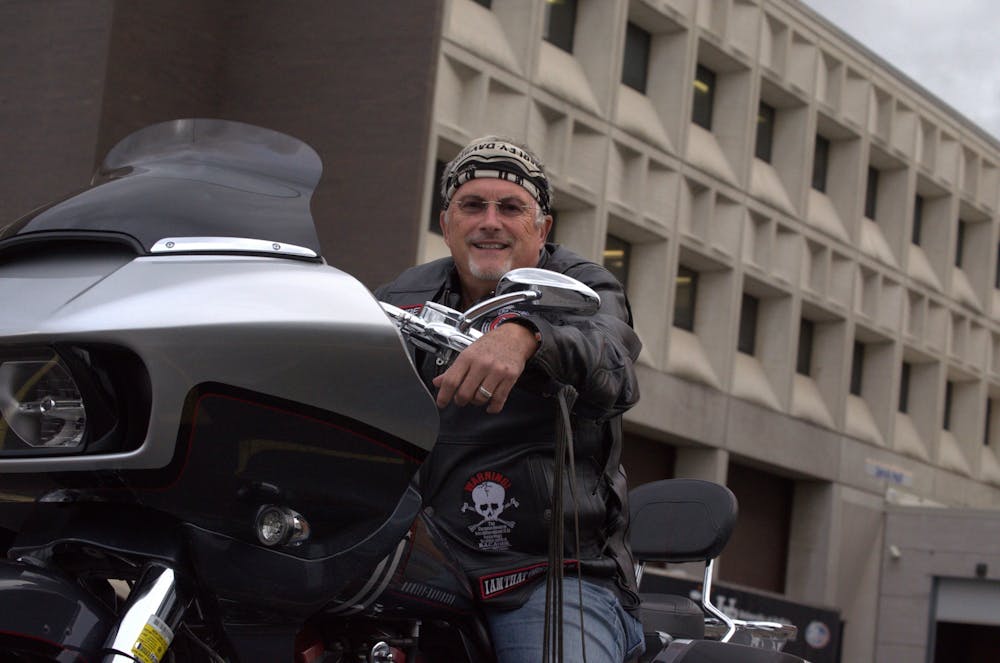Editor’s note: B.A.C.A. members request anonymity to preserve their secret identity. The interviewee featured in this story will be referred to by his “road name” of Caribe.
Caribe is both a biker and a lawyer.
Clad in a leather vest and riding a Harley-Davidson motorcycle, no one would expect that the UB alum spends his days as both a civil lawyer and as a member of Bikers Against Child Abuse (B.A.C.A.), an organization that provides comfort, safety and support for abused children.
“It’s a seriously large disconnect, because the people who know me as a lawyer can’t see me as a biker,” Caribe said. “And the people who know me as a biker have a hard time seeing me as a lawyer. It’s kind of funny — I get teased by both sides.”
His interest in a law career was sparked during an “argument over a haircut” with his mom, who told him mid-argument that he should be a lawyer.
“I actually stopped and thought ‘Gosh yeah, maybe. Maybe that would be a fun thing to do,’” Caribe said.
He bought a motorcycle to commute from his apartment in North Buffalo to campus while attending UB law school, which sparked his “lifelong passion” for motorcycles, a love that continued even after he became a lawyer.
Caribe recalls learning about B.A.C.A. while working in court, where he saw the organization’s members escort a child in an adjourning courtroom. The judge, knowing that he was a biker, suggested that he look into the organization.
Years later, he now serves as a public relations board member for the Buffalo chapter.
“It was a way to mix my passion for motorcycles with a really great organization that really does a lot of good,” he said.
B.A.C.A. provides a variety of services to support their mission. After a child is referred to B.A.C.A., the chapter rides to meet them, give them their own vest with a B.A.C.A. patch and offer rides on their motorcycles. The child is also given comfort items like a teddy bear — which is “pumped up with love and hugs” — and told that the chapter will return to give the bear more hugs if it goes down.
“In essence, we bring the child into the organization to make them feel like they’re part of the family,” Caribe said.
The rest of the day is spent doing what the child wants to do.
“I’ve done everything from playing dodgeball, to soccer, to having a makeover with lipstick and eyeliner, ” Caribe said.
These activities allow the child to feel protected and give them courage. One of Caribe’s favorite moments was speaking to the child liaison after a day out with a child and being told that the child had “changed her mind and want[ed] to testify against her abuser.”
Two members of the organization are appointed as the child’s primary contacts. The child can call whenever they feel afraid or need someone to talk to.
“The thing that attracted me to B.A.C.A., though, as a lawyer, was that a lot of children end up getting empowerment through justice in the criminal system,” Caribe said. “And that’s one of probably the scariest things, I think, for a child to try to encounter — to navigate the criminal justice system.”
B.A.C.A. tries to alleviate this fear by appearing in court and providing 24/7 security at the child’s house so the child feels safe.
“My favorite story is when members of my chapter stood out in front of a child’s house in a raging blizzard, while the child was inside tapping on the window, waving,” Caribe said. “The child slept soundly and our chapter froze to death. But, you know, we gladly did it and we’ll gladly do it again.”
The organization also fills in the gaps that other departments may not have the ability or time to do.
“The police just don't have the manpower to stand out in front of a child’s house so that they’ll feel safe…it’s not their job,” Caribe said, adding that they’re not there to be vigilantes or intimidate the perpetrator, but to solely empower the child.
An evaluation of B.A.C.A.’s programs saw that the children “demonstrated substantial improvements in their overall levels of emotional distress, conduct concerns, hyperactivity, and behavioral and emotional functioning,” according to the literary analysis.
“It is very emotionally demanding and demanding of your time as well, but very rewarding,” Caribe said.
He describes his relationship with his chapter as family, since they spend so much time together in often stressful situations, as well as the fact that it takes over a year of training to become a full member.
“[The members] come from every walk of life. There is blue collar, there is white collar, there are men, there are women — every race, creed, color, national origin…We are there solely for the narrow mission of empowering abused children,” Caribe said. “Anybody who wants to carry the flag on the mission is welcome.”
Those who are interested can learn more about Bikers Against Child Abuse at bacaworld.org.
Jasmin Yeung is an assistant news/features editor and can be reached at jasmin.yeung@ubspectrum.com





